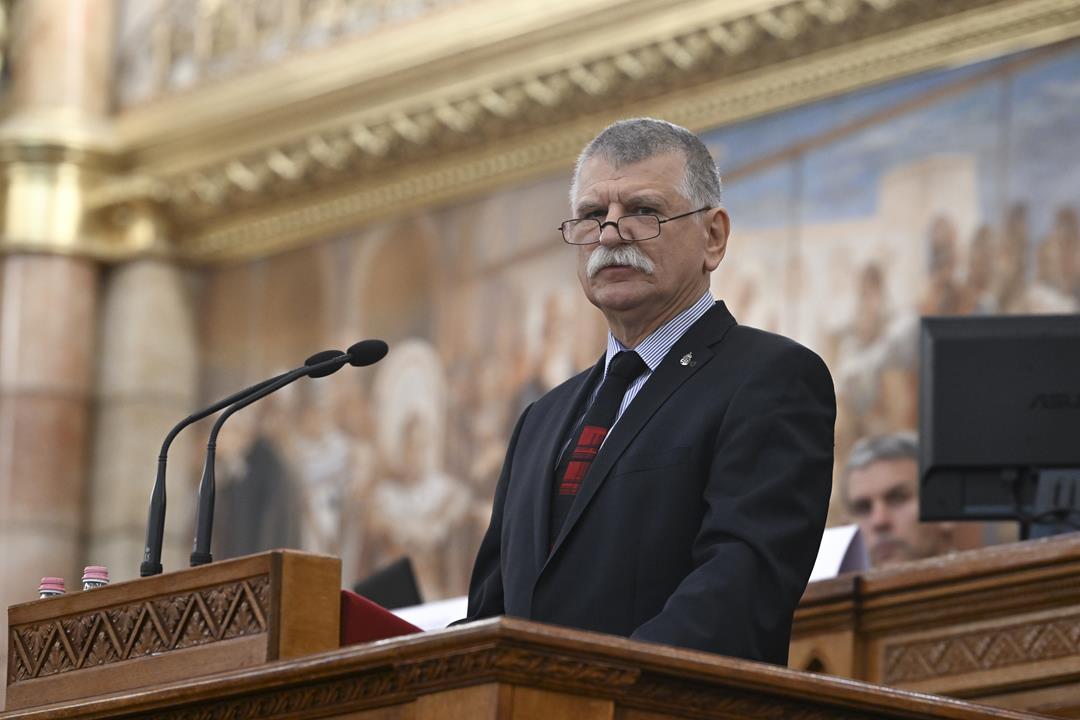Change language:
Speaker Kövér: Hungary, China have similar views of the “present and future of the world” – UPDATED
Speaker of Parliament László Kövér met Wang Huning, the chairman of the Chinese People’s Political Consultative Conference (CPPCC) in Beijing on Wednesday, the parliament’s press chief said.
Kövér and Wang discussed bilateral ties as well as international affairs, Zoltán Szilágyi said.
Kövér said the two countries had similar views of the “present and future of the world, and our relations are characterised by mutual respect and by not interfering with each other’s affairs.”
Hungary is striving to build a pragmatic relationship with the People’s Republic of China, and “does not wish to mix ideology with economic cooperation.” It is working to strengthen connectivity in the world, and “we picture our country as a meeting point of eastern and western capital in the future”, he said. “We do not support policies raising the spectre of an economic war and restricting cooperation between the EU and China.”

Hungary will remain a home for Chinese investments
“We aim to continue to offer a home for Chinese investments in Hungary, to further strengthen trade, and to increase Hungarian exports into China,” Kövér said.
Challenges such as climate change, the effect of pollution and mass illegal migration, which are hitting both countries “in a volatile and dangerous international situation”, can only be solved through joint effort, he said.
Wang said ties between the two countries had never been stronger, “and China greatly appreciates Hungary’s efforts to solve international conflicts too.” He praised the “multilayered cultural ties” between Hungary and China, adding that Hungary was home to 5 Confucius Institutes and a bilingual Hungarian-Chinese elementary and secondary school.
Hungary’s parliamentary delegation attended a gala marking the 75th anniversary of diplomatic ties between the countries at the Chinese National Opera House, organised by Hungary’s embassy to Beijing.
Kövér: dynamic development in Hungarian-Chinese ties
Speaker of Parliament László Kövér left Beijing and paid a visit to Chongqing, parliament’s press office reported on Friday.
UPDATE: Hungarian-Chinese Investor Roundtable holds inaugural meeting
The Hungarian-Chinese Investor Roundtable (MKBKA) held its inaugural meeting at the end of October, the body told MTI on Thursday. The MKBKA is a body of independent experts established to support the achievement of goals in the Belt and Road Initiative intergovernmental strategic cooperation agreement through recommendations and consultation. The roundtable will also contribute to the preparation and implementation of bilateral projects.
The MKBKA aims to enhance Hungary and China’s broad strategic partnership and advance cooperation in the areas of economy, trade, agriculture, investments, transportation, education, science, technology, healthcare, sport, culture and tourism. Members of the MKBKA include the Budapest Chamber of Commerce and Industry (BKIK), the Hungarian Association of Industrial Parks, the China Trade Information Center and the Eurasia Centre of Neumann Janos University.
The members elected Tamás Janzsó, the head of the Hungarian Association of Industrial Parks, to lead the roundtable. Members also decided to open an office in China, set up a portal for preparing projects and create databases of investment locations and suppliers. A Eurasia Club will be established for networking.
Brussels must rethink pro-war strategy in wake of Trump victory, says Fidesz
Brussels must rethink its pro-war strategy in the wake of the victory of Donald Trump at the US presidential election, András László, an MEP of ruling Fidesz said on Wednesday.
László said “Trump’s victory came as a shock” for Brussels, adding that the EU had “expected an extended period of support for Ukraine, with US help, but if Trump keeps his promise and tries to quickly end the war in Ukraine, it means that the pro-war strategy must be re-thought in Brussels.”
He added that “in that case practically everything will have to be handled from the EU budget and defence industry, which will create an entirely new situation”.
Meanwhile, László said that Trump had also urged NATO member states to spend 2 percent of their GDP on defence spending, in line with NATO directives, during his first term. Trump warned the member states not to rely on the alliance “just because its article 5 ensures protection from the US in the case of an attack,” László added.
Trump had expected the member states already at that time to shoulder their share in NATO activities, he said.
László added that Hungary had announced large military and defence investments years ago in order to carry out the modernisation of the army which is still under way.
Featured image: László Kövér in the Hungarian Parliament
Read also:
- Hungarian Speaker: “No issue is more important in Europe today than demography” – read more HERE
- Hungary’s parliament to start debating 2025 draft budget in mid-November








Hungary and the Communist Party of China have “similar views of the present and future world”. When Hungary has similar views of the world as Western democracies do please let us know.
That’s pretty scary, NGL, because I do not want social credit scores, digital currencies, rampant censorship, and everything else the ChinComs love…
..at the same time, I don’t want illegal migration, “gender” nonsense, endless pointless wars, Net Zero slingshoting us back into the Middle Age, and everything else the West is graciously offering–nay, imposing on–us.